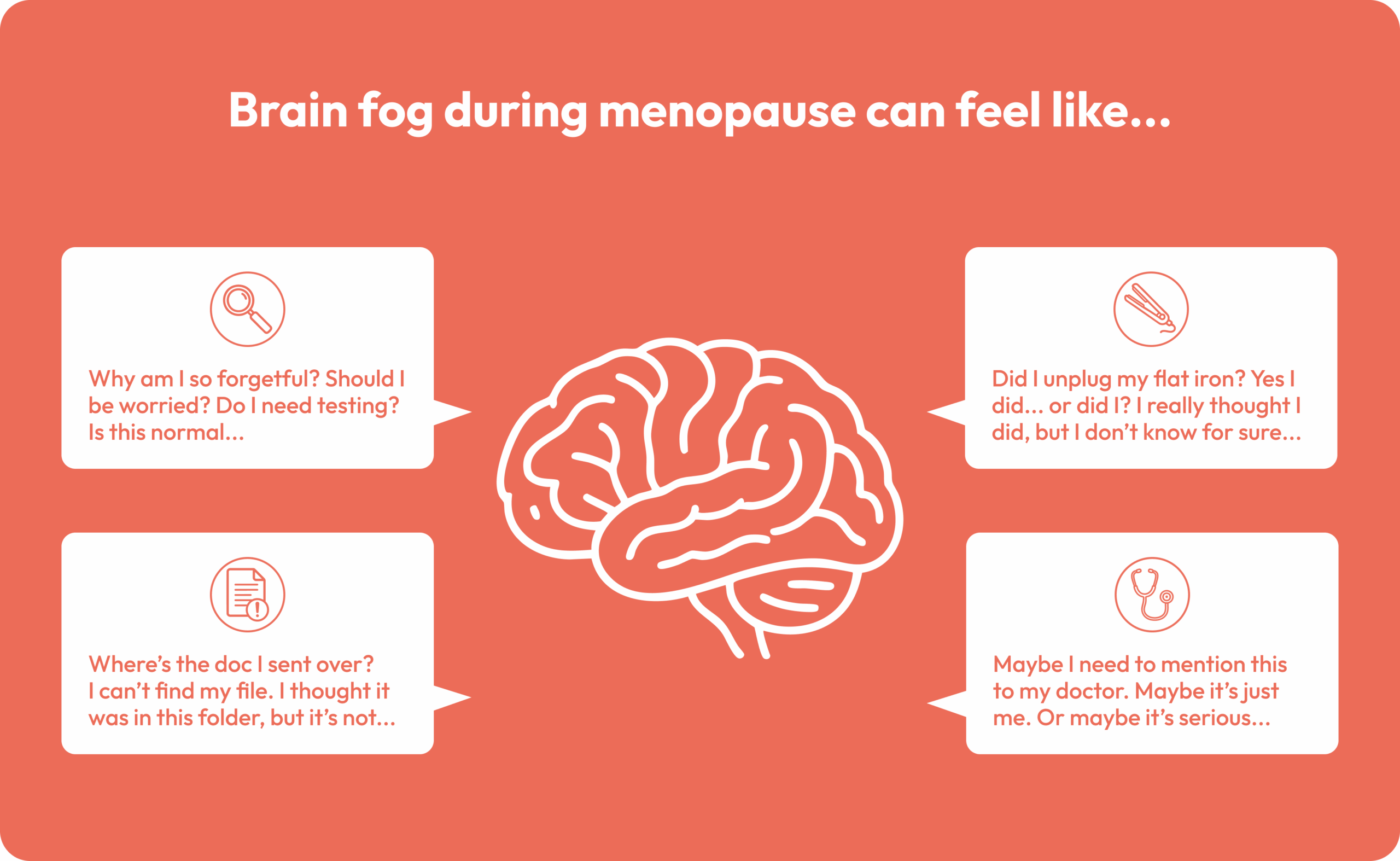Menopause brain fog: Causes, symptoms, & treatments
Have you found yourself searching for words mid-sentence or forgetting why you walked into a room? Menopause brain fog doesn’t get as much attention (or as many TikTok videos) as hot flashes or night sweats, but it affects 60% of menopausal women.
That frustrating mental fuzziness comes from the same hormonal shifts causing your other symptoms. When estrogen and progesterone fluctuate, the effect goes beyond triggering hot flashes to interfere with memory, concentration, and how you function, leaving you feeling like you’re walking through life in a haze.
The good news is you’re not powerless against brain fog. While you can’t stop hormonal fluctuations, you can manage cognitive symptoms during this transition and beyond. We’ll help you understand what brain fog is, what the timeline looks like, what the symptoms feel like, and how to take control with a few strategies.
What is menopause brain fog?
If you’re wondering whether brain fog is a symptom of menopause or a sign of something more concerning, rest assured, research supports the link between hormonal changes and cognitive function. Low levels of hormones like estrogen and progesterone can cause a drop in serotonin and dopamine, resulting in forgetfulness, poor concentration, and trouble focusing.
These changes should also be viewed within the broader context of aging. As Dr. Sheryl Ross (Dr. Sherry), Chief Medical Officer of Women’s Health at QuickMD, explains, “Normal aging also contributes to memory and brain fog issues, so the overlap makes these symptoms seem more pronounced.”
What causes brain fog?
While we often hear about hot flashes, night sweats, and irregular periods during menopause and perimenopause, brain fog is one of those equally annoying but less-talked-about symptoms.
While all of these wild hormonal swings and lack of focus can make you feel like you’re not in control of your own body, there are ways to manage this condition and take back control of your health. “It’s important to know that brain fog is influenced by our gut health, blood sugar balance, inflammation, cortisol levels, and our sleep quality,” notes Dr. Sherry.


How long does brain fog last?
Menopause brain fog usually begins during perimenopause and feels more noticeable during menopause. You’ll likely experience good weeks mixed with challenging ones.
The typical progression looks like this:
- Perimenopause (1–8+ years): Brain fog comes and goes unpredictably. Symptoms often intensify in the last 6–12 months before menopause.
- Around menopause (12 months after final period): Symptoms usually feel strongest during this phase.
- Early post-menopause (1–3 years after): Steady improvement in mental clarity for many women, though the pace varies.
Symptoms and common experiences
Women describe menopause brain fog in different ways. Some call it mental dullness or feeling “daydreamy,” while others use more colorful comparisons of feeling incoherent or even “hungover” without having had so much as a sip of wine. No matter what you say about it, the experience is the same: thinking becomes harder, focusing seems impossible, and the frustration builds.
Here’s what menopause brain fog symptoms actually feel like day-to-day:
| Symptom | What it feels like |
| Difficulty staying focused | “My brain can’t process anything that needs a higher level of thinking.” |
| Slowed thinking | “I feel like I’m moving in slow motion.” |
| Forgetfulness | “How did I lose my keys again?” |
| Trouble making decisions | “I don’t have the energy to decide what to wear today.” |
| Difficulty expressing yourself clearly | “What was I saying? It’s on the tip of my tongue…” |
| Mental exhaustion | “By 2pm, I hit a wall and my brain just shuts down.” |
| Mental cloudiness | “It feels like fog is actually enveloping my brain.” |
For most women, brain fog emerges during perimenopause when hormonal fluctuations are most erratic. This is when symptoms feel most intense and unpredictable. You might experience sharp thinking one week and feel completely unfocused the next.
Fortunately, brain fog often improves as you move through menopause. As hormones stabilize in the post-menopausal years, many women notice their mental clarity returning.
Managing brain fog
Ready for some good news? Brain fog responds to intervention. From daily habits and stress management to medical interventions, small shifts can create improvement in cognitive function. Here are proven strategies that show you how to manage menopause brain fog.
Daily habits
Offload mental work with external support systems like digital reminders, note-taking apps, or planners to track what needs to be done. Break big tasks into smaller, manageable steps with checklists so nothing falls through the cracks. Create a designated spot for your keys, wallet, and phone so they always live in the same place.
Nutrition and hydration
A diet that emphasizes omega-3-rich fish, leafy greens, berries, and nuts supports brain health, while reducing processed sugars helps avoid energy crashes that worsen fog. Staying hydrated throughout the day is equally important. Even mild dehydration impairs concentration and memory. Aim for consistent water intake rather than chugging large amounts at once.
Sleep habits
Good sleep habits have a significant positive impact on cognitive function. Keep a consistent bedtime and wake routine, limit caffeine and alcohol at night, and use cooling bedding to manage night sweats that disrupt rest. Wind-down rituals like reading or gentle stretches signal your brain that it’s time to sleep.
Physical and mental exercise
Challenge your body and mind to keep your brain agile. Aerobic activities like walking, swimming, or cycling boost blood flow to the brain, while strength training supports overall health. Add cognitive challenges like puzzles, learning a new language, or picking up a new skill, like cooking, to keep neural pathways sharp.
Manage stress
While you can’t avoid life’s stresses, you can change how your body and mind respond to them. Practices like mindfulness meditation, yoga, and breathing exercises help calm your nervous system and create room between trigger and reaction. If stress or mood issues persist despite your efforts, seeking professional support through cognitive behavioral therapy (CBT) or counseling is both normal and beneficial. Many women find that talking with a therapist provides tools and perspective that make a difference.
Medical interventions
Hormone therapy for menopause, also known as menopause hormone therapy (MHT), addresses declining estrogen as the root cause of brain fog and can significantly improve cognitive symptoms for many women.
There are also non-hormonal options available. According to Dr. Sherry, “Vyvanse and other ADHD medications can be helpful with menopausal symptoms related to staying focused, organized, managing time, improving concentration, forgetfulness, and memory, also known as ‘foggy brain.’” She adds that, “Even if you have not been officially diagnosed with ADHD in the past, menopause can throw you into an ADHD-like state.”
Always consult with your healthcare provider to discuss which treatments are right for your situation and health history.
Struggling to think clearly or stay focused? See how hormone therapy can help you regain control.
Hormonal changes during menopause can cloud your concentration and memory. QuickMD doctors can help you find clarity again with personalized hormone therapy and expert support.
We just launched our Menopause Hormone Therapy Membership in select states, and your first month’s on us. You’ll get to meet with a doctor, ask all your questions, and see if treatment might help.
If you love it and want to keep going, it’s $ 79/month after that, with special member pricing on medication and regular access to your doctor. And if you decide it’s not for you – that’s totally fine too. Get started by booking your free visit now.

